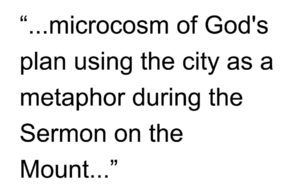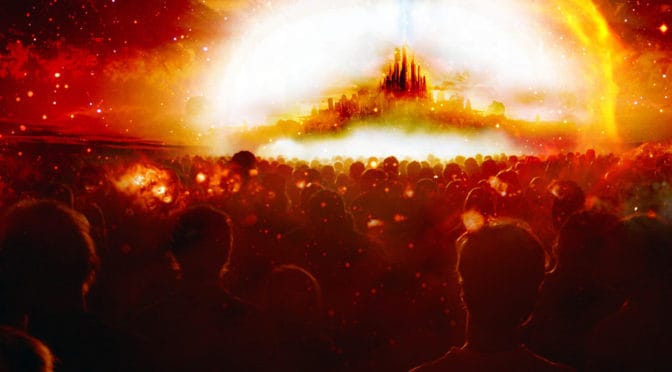
The Biblical City: Redux
By Dr. Mark David Major, AICP, CNU-A The Outlaw Urbanist contributor
Can the Holy Bible tell us anything about urbanism?
It might seem unusual to investigate the Holy Bible for information about urbanism but the idea is not completely off-the-wall. In fact, it’s the subject of a fascinating 1997 study, The City in the Bible: A Relational Perspective, by the Jubilee Center in Cambridge, England and commissioned by the Anglican Church of England (Crook, 1997). The Jubilee Centre is a non-profit Christian social reform organization that “offers a biblical perspective on issues and trends of relevance to the general public” (Source: Jubilee Centre). Other writers have also examined biblical descriptions of city planning, such as those found in the Old Testament books of Leviticus and Ezekiel (Gallion and Eisner, 1963; Frick, 1997; Reps, 1979; Hawkins, 1986). However, the most comprehensive research appears to principally derive from a social science or religious studies perspective instead of architecture or urban planning. In part, this is understandable since it’s almost impossible to separate religious doctrine from any investigation of the Holy Bible, whatever the subject. The expressed purpose of the Jubilee Centre study is to explore “God’s view of today’s city (and) how modern Christians should address urban problems” with particular emphasis on the “local action” of Christians in “political and community involvement” (Crook, 1997; 5-6).
Crook (1997) correctly points out the commonly accepted, anti-urban stereotype of the Holy Bible – and presumably of God, which reached its apex beginning in the 19th century with social reformers such as Ebenezer Howard, persisting to this day – derives from popular culture perception of its most famous stories; the Garden of Eden, the construction of the Tower of Babel as a rebellion against God, God’s wrath against Sodom and Gomorrah, Jewish revolts against Rome, and Jesus’ entry/subsequent crucifixion in Jerusalem. It is an incomplete picture but even Crook is somewhat guilty of playing to this anti-urban stereotype in his 1997 study, arguing cities began and continue “in sin and rebellion… violence… corruption and oppression” (7). This statement can be equally applied to humanity in general, and not necessarily only cities in particular. However, the overwhelming majority of references to the city in the Holy Bible are neutral (see The Biblical City, Part 2), and the two most important in the New Testament are positive. As Crook (1997) concedes, “cities… represent a microcosm of God’s redemptive plan. The Bible begins in a perfect garden, but ends in a redeemed city, the New Jerusalem” (6). Jesus first introduces this microcosm of God’s plan using the city as a metaphor during the Sermon on the Mount, saying, “You are light for the world. A city built on a hill-top cannot be hidden” (NJB Matthew 5:14). In 1630, this was the source for Puritan John Winthrop’s sermon, “A Model of Christian Charity”, promoting a “city on a hill” that would become Boston. During the 20th century, John F. Kennedy and Ronald Reagan expanded on this reference in expressing an ideal of American exceptionalism as “a shining city on a hill” and a model for the entire world. In all three cases, the city is presented as an ideal to achieve (be it God’s salvation, Christian charity, or American exceptionalism) and not merely a hotbed for sin, violence, and corruption. One is forced to wonder how our planning of contemporary cities might be improved if we started from the premise that the city is a Divine ideal to achieve instead of an Earthly problem to solve.
References
Crook, A. 1997. The City in the Bible: A Relational Perspective. Cambridge, England: Jubilee Centre. Report commission by the Anglican Church of England.
Frick, F. 1977. The City in Ancient Israel. Princeton: SBL Dissertation Series 36.
Gallion, A.B. and S. Eisner. 1963. The Urban Pattern: City Planning and Design, Second Edition. Princeton: D. Van Nostrand Company, Inc.
Hawkins, P. 1986. Civitas: Religious Interpretations of the City. Atlanta, Georgia: Scholars Press Studies in the Humanities.
Reps, John W. 1979. Cities of the American West: A History of Frontier Urban Planning. Princeton, NJ: Princeton University Press.
NEXT: The City of Wisdom
The Biblical City is a new series from The Outlaw Urbanist.

